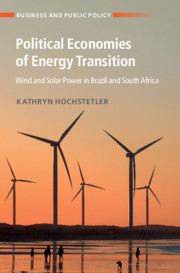Crossref Citations
This Book has been
cited by the following publications. This list is generated based on data provided by Crossref.
Purdon, Mark
Witcover, Julie
Murphy, Colin
Ziaja, Sonya
Winfield, Mark
Giuliano, Genevieve
Séguin, Charles
Kaiser, Colleen
Papy, Jacques
and
Fulton, Lewis
2021.
Climate and transportation policy sequencing in California and Quebec.
Review of Policy Research,
Vol. 38,
Issue. 5,
p.
596.
Gao, Xue
Davidson, Michael
Busby, Joshua
Shearer, Christine
and
Eisenman, Joshua
2021.
The Challenges of Coal Phaseout: Coal Plant Development and Foreign Finance in Indonesia and Vietnam.
Global Environmental Politics,
Vol. 21,
Issue. 4,
p.
110.
Meckling, Jonas
Lipscy, Phillip Y.
Finnegan, Jared J.
and
Metz, Florence
2022.
Why nations lead or lag in energy transitions.
Science,
Vol. 378,
Issue. 6615,
p.
31.
Lockwood, Matthew
2022.
Policy feedback and institutional context in energy transitions.
Policy Sciences,
Vol. 55,
Issue. 3,
p.
487.
Alcañiz, Isabella
and
Gutiérrez, Ricardo A.
2022.
The Distributive Politics of Environmental Protection in Latin America and the Caribbean.
Paterson, Matthew
Tobin, Paul
and
VanDeveer, Stacy D.
2022.
Climate Governance Antagonisms: Policy Stability and Repoliticization.
Global Environmental Politics,
Vol. 22,
Issue. 2,
p.
1.
Boasson, Elin Lerum
and
Tatham, Michaël
2023.
Climate policy: from complexity to consensus?.
Journal of European Public Policy,
Vol. 30,
Issue. 3,
p.
401.
Verner, Marija
2023.
Political Trust and Ecological Crisis Perceptions in Developing Economies: Evidence from Ecuador.
Latin American Politics and Society,
Vol. 65,
Issue. 4,
p.
147.
Boasson, Elin Lerum
Burns, Charlotte
and
Pulver, Simone
2023.
The politics of domestic climate governance: making sense of complex participation patterns.
Journal of European Public Policy,
Vol. 30,
Issue. 3,
p.
513.
Davidson, Michael R.
Gao, Xue
Busby, Joshua
Shearer, Christine
and
Eisenman, Joshua
2023.
Hard to say goodbye: South Korea, Japan, and China as the last lenders for coal.
Environmental Politics,
Vol. 32,
Issue. 7,
p.
1186.
Meckling, Jonas
and
Karplus, Valerie J.
2023.
Political strategies for climate and environmental solutions.
Nature Sustainability,
Vol. 6,
Issue. 7,
p.
742.
Paterson, Matthew
Wilshire, Stanley
and
Tobin, Paul
2023.
The Rise of Anti-Net Zero Populism in the UK: Comparing Rhetorical Strategies for Climate Policy Dismantling.
Journal of Comparative Policy Analysis: Research and Practice,
p.
1.
Prontera, Andrea
and
Rubino, Alessandro
2023.
Greening energy governance through agencification in the Global South: Drivers and implications.
Regulation & Governance,
Isah, Abdulrasheed
Dioha, Michael O.
Debnath, Ramit
Abraham-Dukuma, Magnus C.
and
Butu, Hemen Mark
2023.
Financing renewable energy: policy insights from Brazil and Nigeria.
Energy, Sustainability and Society,
Vol. 13,
Issue. 1,
Death, Carl
2024.
Narrating transitions to low carbon futures: the role of long-term strategies (LTS) in fossil fuel producing emerging economies.
New Political Economy,
p.
1.
Leal, José Manuel
and
Paterson, Matthew
2024.
Transnational city networks, global political economy, and climate governance: C40 in Mexico and Lima.
Review of International Political Economy,
Vol. 31,
Issue. 1,
p.
26.
Almeida, Paul
González Márquez, Luis Rubén
and
Fonsah, Eliana
2024.
The forms of climate action.
Sociology Compass,
Vol. 18,
Issue. 2,
de Gaspi, Renato H.
2024.
Forging alliances: political competition and industrial policy in democratic Brazil.
Third World Quarterly,
Vol. 45,
Issue. 5,
p.
981.
Schmidt, Leonard
Apergi, Maria
Eicke, Laima
and
Weko, Silvia
2024.
Who believes in green growth? Strategic framing and technology leadership in the UNFCCC negotiations.
Climate Policy,
Vol. 24,
Issue. 2,
p.
177.
Alarcón, Pedro
2024.
What next for supply-side policy in the south: emerging lessons from Ecuador’s Yasuní initiative.
International Environmental Agreements: Politics, Law and Economics,





